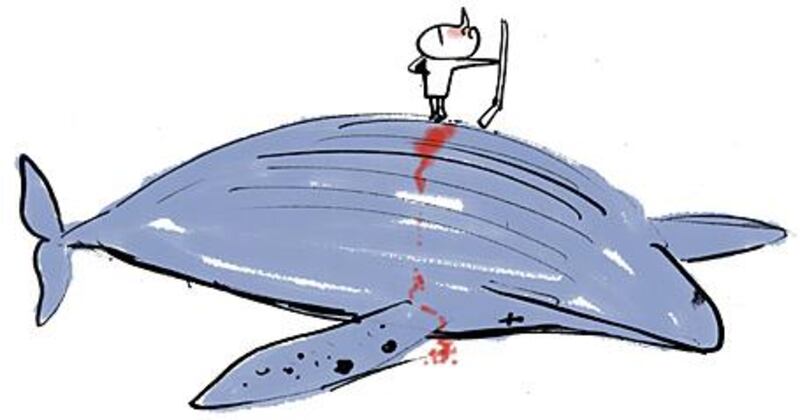The grind of the 21st century throws up obstacles at every turn. Nikolaus Oliver is on hand with advice to guide you through. This week: why we no longer want to 'save the whales'. Once, in the 1980s, whales were totemic to the environmental movement. "Save the whales", we were urged with monotonous and self-righteous regularity. You seldom hear that now. Don't people want to save them any more? Did they commit some environmental faux pas? Did they refuse to recycle? Did they advocate cutting down rainforests? What happened?
I think the answer is globalisation. It's fairly low-risk to say that: the answer to most things seems to be globalisation. Like so many environmental causes, whales have, metaphorically, been crushed under the wheels of the great juggernaut of climate change - the literal globalisation of environmentalism. Big as they are, whales are just not big enough to compete. But a few of us still care about them. So when nine sperm whales washed up on Italy's southern coast recently, people rushed out there to see how they could help.
Whales always seem to be doing this, getting themselves stranded on beaches and then being unable or unwilling to go away again. They inevitably pay the ultimate price for this unfathomable wish to come ashore (don't do it, whales, there's nothing for you here). What is it that they want from us? Compensation for the generations of their ancestors who were turned into corsetry and oil for lamps? Will Bill Clinton or Tony Blair have to stand up and apologise, as they did for the slave trade and the Irish potato famine?
Is it boredom? Because, after all, whales are said to be smart, being mammals and having mysterious musical and communication skills and all. (I myself have never been persuaded of their vocal skills - they always seem to have trouble on the high Cs - high Cs, get it?) And let's be honest, fish and squid are poor company and, taken with the peripatetic lifestyle of most whales, their social lives must be really dull. So when they see us partying and having, as it were, a whale of a time on the beaches, they probably think, "I want that", and try to join in.
I suspect they're really very dull - the trainspotters of the seas. One is tempted to join with the Z-list British celeb who insulted the great Welsh nation a few years ago by questioning the usefulness of its citizens. Taking her lead, I ask, whales, what is the point of them? You see what I mean, don't you?






